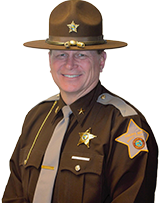Why Would A Deputy Sheriff Stop You?
There are many different reasons why you may be stopped by a law enforcement officer. Whatever the reason, your cooperation is requested and appreciated. A few of the possible reasons for being stopped:
- The Deputy may want to warn you about a potentially dangerous situation.
- You may have committed a traffic violation.
- Your vehicle may match the description of one used in a criminal act.
- The Deputy might think you are in trouble and need help.
- You may have knowingly or unknowingly witnessed a crime.
If you are stopped by a Deputy while driving, you may be confused, anxious, or even angry. These are natural feelings, but remember, traffic stops can also be stressful and dangerous for the Deputy.
Each year, a number of law enforcement officers are killed or injured while making a “routine” traffic stop. Officers are especially vulnerable during the hours of darkness. With this in mind, there are things you, as a law abiding citizen, can do to lessen the uneasiness of the experience.
What Should You Do If Stopped By A Deputy Sheriff?
- When you see the red/blue emergency lights and it appears that the Deputy is attempting to stop you, and not pass you on an emergency call, remain calm, slow down and pull over in a safe location on the shoulder or nearby parking lot.
- Do not exit your vehicle unless instructed to do so. This is for safety reasons. (Each year officers and pedestrians are struck by passing vehicles.)
- At night, turn on your interior dome lights.
- Keep your hands in a position where the Deputy can see them, preferably on the steering wheel.
- Inform the Deputy of any weapons in your vehicle and their location. Do not reach or point to the location.
Avoid any sudden movements, for any reason! - Comply with the Deputy’s request to see your driver’s license and registration. If the documents are out of reach, tell the Deputy where they are before you reach for them.
- If there are passengers present in the vehicle, encourage them to remain quiet and cooperate with instructions. You, as the operator, are responsible for your vehicle and occupants.
- Avoid becoming argumentative. Arguing will not change the Deputy’s mind. If you wish to contest the violation, you will have an opportunity to address the matter in court.
- Answer all questions truthfully.
- The Deputy may issue a summons for the violation. If the reason is vague or unclear, politely ask the Deputy for details.
- If asked to sign the summons, it is not an admission of guilt.
- Understand that each situation is unique and the Deputy must alter his or her response to fit the circumstances of the traffic stop. Generally; however, a Deputy will provide his or her name upon request, will inform you of the reason you’re being stopped, and will only arrest a person for a violation of law committed in the officer’s presence, or when the officer has probable cause to believe the person has already committed the crime.
QUESTIONS / COMPLIMENTS / COMPLAINTS
If you have a question about these procedures or a complaint about your treatment, contact the Sheriff’s Department and ask to speak with a supervisor. You may also send a letter of compliment if you feel the Deputy was particularly helpful in your situation. Compliments or complaints about officer conduct should be specific and made within a reasonable time.

